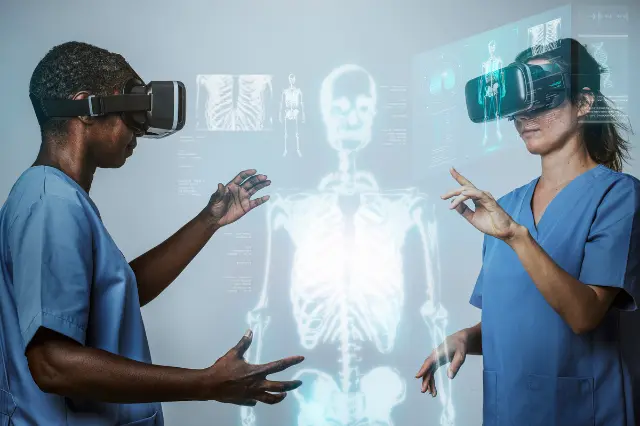A recent video on Twitter showcasing ChatGPT’s ability to make a medical diagnosis that was missed by 17 doctors has ignited considerable debate and curiosity. This event underscores the growing significance and potential of AI and machine learning in healthcare management.
As AI technologies like ChatGPT become more advanced, their role in enhancing various aspects of healthcare, from predictive analytics for patient care to the development of personalized medicine, becomes increasingly critical.
This post looks into the transformative impact AI is having on healthcare, exploring its applications in predictive analytics, diagnostic accuracy, hospital operations, and more, demonstrating how AI is reshaping healthcare management towards a more efficient, personalized, and predictive future.
Predictive Analytics for Patient Care
In healthcare management, particularly through AI algorithms, predictive analytics are crucial in analyzing patient data to forecast health risks and outcomes. This advanced approach involves several methodologies and has proven to be effective in various aspects of patient care.
One of the key methods used in predictive analytics is Gradient Boosting Machines (GBMs). GBMs are nonparametric methods that create several decision trees sequentially, each building on the information from the previous one. This method is particularly effective for structured data and can handle various variable types and missing data without requiring imputation. A study conducted by the Cleveland Clinic used GBMs to predict patient readmission and length of stay, demonstrating the practical application of these models in real-world healthcare settings.
Other methods like linear regression, logistic regression, decision trees, and random forest are also integral to healthcare predictive analytics. Linear regression, despite its simplicity, is not always suitable for nonlinear relationships in healthcare data. Logistic regression is more appropriate for predicting categorical outcomes in healthcare, like disease occurrence.
Decision trees and random forests offer more complex models that can handle a wide range of data types and are especially useful for classification and regression tasks in healthcare. These methods provide a deeper understanding of the variables in the data, helping to identify key factors influencing patient outcomes.
Through these techniques, predictive analytics aids in early disease detection, personalizing treatment plans, and developing preventive care strategies. The ability to analyze extensive and diverse patient data enables healthcare providers to tailor their approaches to individual patient needs, ultimately leading to better patient outcomes and more efficient healthcare management.
Enhancing Diagnostic Accuracy
Machine learning models are increasingly pivotal in enhancing diagnostic accuracy in healthcare, particularly in pathology and radiology. These AI tools assist pathologists in various tasks, including object recognition, detection, segmentation, and image analysis of tumors. They can extract numerous features from whole slide images (WSIs) and make diagnostic predictions, sometimes identifying details challenging for pathologists to discern.
For example, AI can accurately assess immunohistochemical biomarkers, quantify cells, evaluate spatial cell arrangements, and standardize scoring criteria for certain cancers. Digital image analysis (DIA) platforms, such as ImageJ, CellProfiler, and QuPath, aid pathologists, especially in quantitative biomarker evaluations.
Significant developments include the CAMYLEON16 and PANDA challenges, where AI algorithms demonstrated high accuracy in tasks like identifying metastasis in breast cancer and Gleason grading in prostate biopsies. Convolutional neural networks (CNNs) are the most widely used deep learning algorithms in pathology, known for their efficiency in image analysis. These advancements indicate a substantial shift in how diseases, particularly cancers, are diagnosed and classified, underscoring the growing importance of AI in medical diagnostics.
Streamlining Hospital Operations
AI tools are enhancing hospital operations by managing patient flow, predicting bed availability, and optimizing staff allocation. A project by the NHS Transformation Directorate developed a web-based user interface integrating AI models for bed allocation, allowing staff to visualize a virtual hospital, showing current occupancy and forecasted demand for beds. This tool supports decision-making in difficult bed allocation and patient decisions, especially under high-pressure situations like emergency admissions.
Also, the use of AI in improving patient bed allocation at Kettering General Hospital involved building a virtual hospital environment model. This system uses historical admission data to predict immediate and future demand, generating patient bed suggestions and building trust in the tool and its underlying AI.
Incorporating AI in patient flow management across an entire healthcare enterprise enables proactive management from one care setting to the next, preventing congestion and overutilization of resources, ultimately saving significant costs.
Development of Personalized Medicine
AI is a powerful tool for developing personalized medicine, utilizing patient data to tailor treatments based on individual genetic makeup, lifestyle, and environment. This approach enhances treatment efficacy and reduces adverse reactions, leading to improved health outcomes. By analyzing a wide array of patient data, AI can identify patterns and correlations that might not be evident otherwise, enabling the creation of highly individualized treatment plans.
Personalized medicine, powered by AI, represents a significant shift from the traditional one-size-fits-all approach in healthcare. It allows for treatments that are specifically designed to work best for each individual, taking into account their unique biological characteristics and personal health histories. This increases the likelihood of successful outcomes and minimizes the risk of side effects that can occur when treatments are not well-suited to a patient’s specific needs.
Remote Monitoring and Telemedicine
AI-powered devices and applications are revolutionizing remote monitoring and telemedicine. They enable healthcare providers to track patients’ health in real-time, essential for chronic condition management and continuous care.
For example, during the development of a Virtual Command Center by Palantir Technologies in collaboration with Cleveland Clinic, AI was used to augment decision-making with insights from hospital data while maintaining patient privacy. This approach aimed to improve patient care and operational efficiency, including care pathway management and operating room scheduling.
Also, AI enhances telemedicine by providing diagnostic support and personalized patient interaction. This improves healthcare accessibility, especially in remote areas, by offering diagnostic support and personalized patient interaction through telemedicine platforms. AI-powered telemedicine tools can analyze patient symptoms, medical history, and other relevant data to assist healthcare professionals in diagnosing and treating patients remotely.
Challenges and Ethical Considerations
Integrating Artificial Intelligence (AI) in healthcare presents significant challenges and ethical considerations that are pivotal for its safe and effective use. One of the primary concerns is the legal and health policy conflicts arising from the application of AI. For instance, using “black-box” algorithms in healthcare raises issues such as medical malpractice and product liability due to the difficulty of explaining how these algorithms arrive at their conclusions. This situation can potentially threaten informed consent, incidental findings reporting, and data security, particularly in the context of facial recognition technology.
The American Medical Association has emphasized the need to develop high-quality and clinically validated AI technologies, indicating a growing awareness of these concerns within the medical community.
Another crucial aspect revolves around AI’s role in medical education. The rise of AI demands a reframing of medical education from focusing solely on knowledge recall to preparing students for a future that involves interacting with and managing AI technologies. This transition requires addressing the ethical and clinical complexities that surface when patients, caregivers, and machines interact. The use of virtual patients (VPs) in medical education is an example, offering benefits and challenges that need to be balanced.
Moreover, a report by the European Parliament identifies several risks associated with AI in healthcare, including potential errors leading to patient harm, risk of bias and increased health inequalities, lack of transparency and trust, and vulnerability to hacking and data privacy breaches. To mitigate these risks, the report suggests measures like multi-stakeholder engagement, increased transparency and traceability, in-depth clinical validation of AI tools, and comprehensive AI training and education for clinicians and citizens.
These challenges highlight the necessity of a careful and ethical approach to integrating AI into healthcare, ensuring that the technology advances medical practices and aligns with legal standards and ethical norms to protect patients and maintain trust in healthcare systems.
Future Prospects of AI in Healthcare Management
The future of AI in healthcare management is set to be revolutionary, focusing on enhancing data analysis and patient care through advanced technologies like machine learning and natural language processing.
AI will play a pivotal role in refining diagnostics and disease management, with applications already emerging in areas like kidney disease diagnosis and patient outcome predictions. The technology’s adaptability to various diseases, as exemplified by Yale researchers’ work on AI algorithms for early diagnosis and outcome prediction, signals a trend towards more personalized and efficient healthcare delivery.
AI’s impact on clinical laboratory testing will be significant, improving accuracy and efficiency in diagnostics for conditions such as skin cancer, diabetic retinopathy, and acute appendicitis. This will lead to quicker, more precise medical decision-making and reduced human error.
Also, AI is set to revolutionize drug discovery and genomic medicine, potentially leading to earlier disease detection and more effective treatment plans, marking a shift towards a more predictive and personalized healthcare system.
As AI tools continue to evolve, they are expected to significantly enhance healthcare outcomes, streamline operations, and contribute to cost reduction, heralding a new era in healthcare management.
Conclusion
As we reflect on the profound influence of AI and machine learning in healthcare management, it’s clear that we’re on the brink of a new era in medical practice and patient care. The advancements we’ve discussed showcase the potential for transformative changes in healthcare and open a gateway to rethinking how we approach medical challenges and solutions. The journey of AI in healthcare is an unfolding story that continually shapes our understanding of medicine, technology, and their intersection in enhancing human health.



